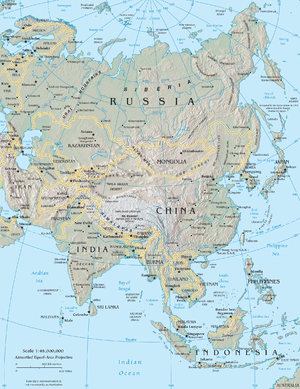 Image via WikipediaAlthough I once thought soy was a great alternative to meat products which often contribute to high cholesterol and other health problems, I have since decided that soy is not the protein substitute I thought it was. Having had some health issues that may have been linked to an increased soy intake, I decided to do some additional research on the subject and not take conventional wisdom and the idea that everyone in Asia eats soy and has no problems with it. What I found is that although people in Japan and China eat soy, they don't eat it in mega doses and they don't tend to eat it in the same form that we do in the West. The kicker for me was when I read that infant formulations containing soy are akin to giving your infant five birth control pills a day....information put out by the Weston A Price Foundation by the way. This kind of information tends to make one pause and reconsider the idea that soy may be beneficial in the ways that we are ingesting here.
Image via WikipediaAlthough I once thought soy was a great alternative to meat products which often contribute to high cholesterol and other health problems, I have since decided that soy is not the protein substitute I thought it was. Having had some health issues that may have been linked to an increased soy intake, I decided to do some additional research on the subject and not take conventional wisdom and the idea that everyone in Asia eats soy and has no problems with it. What I found is that although people in Japan and China eat soy, they don't eat it in mega doses and they don't tend to eat it in the same form that we do in the West. The kicker for me was when I read that infant formulations containing soy are akin to giving your infant five birth control pills a day....information put out by the Weston A Price Foundation by the way. This kind of information tends to make one pause and reconsider the idea that soy may be beneficial in the ways that we are ingesting here. Soy is in everything these days, from infant formula to coffee creamers to meat substitutes. We were told it was a safe product, that it is a miracle food and that we can eat it without thought to any side effects. However, I would caution any woman whose body tends to grow extraneous things like cysts, growths, tumors or the like....do your homework on soy and decide for yourself whether it is something you want to be eating. WAP indicates that soy inhibits pancreatic function and what happens when our pancreas doesn't work right? You got it....blood sugar issues. It also increases our need for Vitamin D which many people don't get a lot of as it is.
 Image via WikipediaSo, in defense of my stance to nary let another soy product pass my lips, I will offer you the following information - again put out by the Weston A Price Foundation. As you read through the following material, pay close attention to the information indicating that soy actually blocks the uptake of certain B vitamins and lowers testosterone levels which is of concern to both men and women:
Image via WikipediaSo, in defense of my stance to nary let another soy product pass my lips, I will offer you the following information - again put out by the Weston A Price Foundation. As you read through the following material, pay close attention to the information indicating that soy actually blocks the uptake of certain B vitamins and lowers testosterone levels which is of concern to both men and women:
 Myths & Truths About Soy
Myths & Truths About Soy
Myth: Use of soy as a food dates back many thousands of years.
Truth: Soy was first used as a food during the late Chou dynasty (1134-246 BC), only after the Chinese learned to ferment soy beans to make foods like tempeh, natto and tamari.
Myth: Asians consume large amounts of soy foods.
Truth: Average consumption of soy foods in Japan and China is 10 grams (about 2 teaspoons) per day. Asians consume soy foods in small amounts as a condiment, and not as a replacement for animal foods.
Myth: Modern soy foods confer the same health benefits as traditionally fermented soy foods.
Truth: Most modern soy foods are not fermented to neutralize toxins in soybeans, and are processed in a way that denatures proteins and increases levels of carcinogens.
Myth: Soy foods provide complete protein.
Truth: Like all legumes, soy beans are deficient in sulfur-containing amino acids methionine and cystine. In addition, modern processing denatures fragile lysine.
Myth: Fermented soy foods can provide vitamin B12 in vegetarian diets.
Truth: The compound that resembles vitamin B12 in soy cannot be used by the human body; in fact, soyfoods cause the body to require more B12
Myth: Soy formula is safe for infants.
Truth: Soy foods contain trypsin inhibitors that inhibit protein digestion and affect pancreatic function. In test animals, diets high in trypsin inhibitors led to stunted growth and pancreatic disorders. Soy foods increase the body's requirement for vitamin D, needed for strong bones and normal growth. Phytic acid in soy foods results in reduced bioavailabilty of iron and zinc which are required for the health and development of the brain and nervous system. Soy also lacks cholesterol, likewise essential for the development of the brain and nervous system. Megadoses of phytoestrogens in soy formula have been implicated in the current trend toward increasingly premature sexual development in girls and delayed or retarded sexual development in boys.
Myth: Soy foods can prevent osteoporosis.
Truth: Soy foods can cause deficiencies in calcium and vitamin D, both needed for healthy bones. Calcium from bone broths and vitamin D from seafood, lard and organ meats prevent osteoporosis in Asian countries—notsoy foods.
Myth: Modern soy foods protect against many types of cancer.
Truth: A British government report concluded that there is little evidence that soy foods protect against breast cancer or any other forms of cancer. In fact, soy foods may result in an increased risk of cancer.
Myth: Soy foods protect against heart disease.
Truth: In some people, consumption of soy foods will lower cholesterol, but there is no evidence that lowering cholesterol improves one's risk of having heart disease.
Myth: Soy estrogens (isoflavones) are good for you.
Truth: Soy isoflavones are phyto-endocrine disrupters. At dietary levels, they can prevent ovulation and stimulate the growth of cancer cells. Eating as little as 30 grams (about 4 tablespoons) of soy per day can result in hypothyroidism with symptoms of lethargy, constipation, weight gain and fatigue.
Myth: Soy foods are safe and beneficial for women to use in their postmenopausal years.
Truth: Soy foods can stimulate the growth of estrogen-dependent tumors and cause thyroid problems. Low thyroid function is associated with difficulties in menopause.
Myth: Phytoestrogens in soy foods can enhance mental ability.
Truth: A recent study found that women with the highest levels of estrogen in their blood had the lowest levels of cognitive function; In Japanese Americans tofu consumption in mid-life is associated with the occurrence of Alzheimer's disease in later life.
Myth: Soy isoflavones and soy protein isolate have GRAS (Generally Recognized as Safe) status.
Truth: Archer Daniels Midland (ADM) recently withdrew its application to the FDA for GRAS status for soyisoflavones following an outpouring of protest from the scientific community. The FDA never approved GRAS status for soy protein isolate because of concern regarding the presence of toxins and carcinogens in processed soy.
Myth: Soy foods are good for your sex life.
Truth: Numerous animal studies show that soy foods cause infertility in animals. Soy consumption enhances hair growth in middle-aged men, indicating lowered testosterone levels. Japanese housewives feed tofu to their husbands frequently when they want to reduce his virility.
Myth: Soy beans are good for the environment.
Truth: Most soy beans grown in the US are genetically engineered to allow farmers to use large amounts of herbicides.
Myth: Soy beans are good for developing nations.
Truth: In third world countries, soybeans replace traditional crops and transfer the value-added of processing from the local population to multinational corporations.
Soy Infant Formula: Birth Control Pills for Babies
Babies fed soy-based formula have 13,000 to 22,000 times more estrogen compounds in their blood than babies fed milk-based formula. Infants exclusively fed soy formula receive the estrogenic equivalent (based on body weight) of at least five birth control pills per day.
Male infants undergo a "testosterone surge" during the first few months of life, when testosterone levels may be as high as those of an adult male. During this period, baby boys are programmed to express male characteristics after puberty, not only in the development of their sexual organs and other masculine physical traits, but also in setting patterns in the brain characteristic of male behavior.
In animals, soy feeding indicates that phytoestrogens in soy are powerful endocrine disrupters. Soy infant feeding reduces testosterone levels in male marmoset monkeys as much as 70% and cannot be ignored as a possible cause of disrupted development patterns in boys, including learning disabilities and attention deficit disorder. Male children exposed to DES, a synthetic estrogen, had testes smaller than normal on maturation.
Almost 15 percent of white girls and 50 percent of African-American girls show signs of puberty, such as breast development and pubic hair, before the age of eight. Some girls are showing sexual development before the age of three. Premature development of girls has been linked to the use of soy formula and exposure to environmental estrogen-mimickers such as PCBs and DDE.
Animal studies indicate that consumption of more than minimal amounts of phytoestrogens during pregnancy may have adverse affects on the developing fetus, the timing of puberty later in life, and thinking and behavior patterns, especially in male offspring.
For a full list of references and further information on the dangers of modern soy products visit our Soy Alert! section or go to www.soyonlineservice.co.nz.
Confused About Soy?--Soy Dangers Summarized
- High levels of phytic acid in soy reduce assimilation of calcium, magnesium, copper, iron and zinc. Phytic acid in soy is not neutralized by ordinary preparation methods such as soaking, sprouting and long, slow cooking. High phytate diets have caused growth problems in children.
- Trypsin inhibitors in soy interfere with protein digestion and may cause pancreatic disorders. In test animals soy containing trypsin inhibitors caused stunted growth.
- Soy phytoestrogens disrupt endocrine function and have the potential to cause infertility and to promote breast cancer in adult women.
- Soy phytoestrogens are potent antithyroid agents that cause hypothyroidism and may cause thyroid cancer. In infants, consumption of soy formula has been linked to autoimmune thyroid disease.
- Vitamin B12 analogs in soy are not absorbed and actually increase the body's requirement for B12.
- Soy foods increase the body's requirement for vitamin D.
- Fragile proteins are denatured during high temperature processing to make soy protein isolate and textured vegetable protein.
- Processing of soy protein results in the formation of toxic lysinoalanine and highly carcinogenic nitrosamines.
- Free glutamic acid or MSG, a potent neurotoxin, is formed during soy food processing and additional amounts are added to many soy foods.
- Soy foods contain high levels of aluminum which is toxic to the nervous system and the kidneys.
You can go here to download a brochure containing this information to give to your friends and family:
http://www.westonaprice.org/soy-alert/927-soy-alert-brochure?qh=YToxOntpOjA7czozOiJzb3kiO30%3D


No comments:
Post a Comment